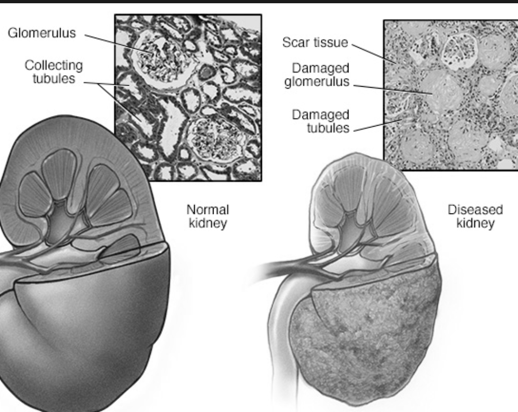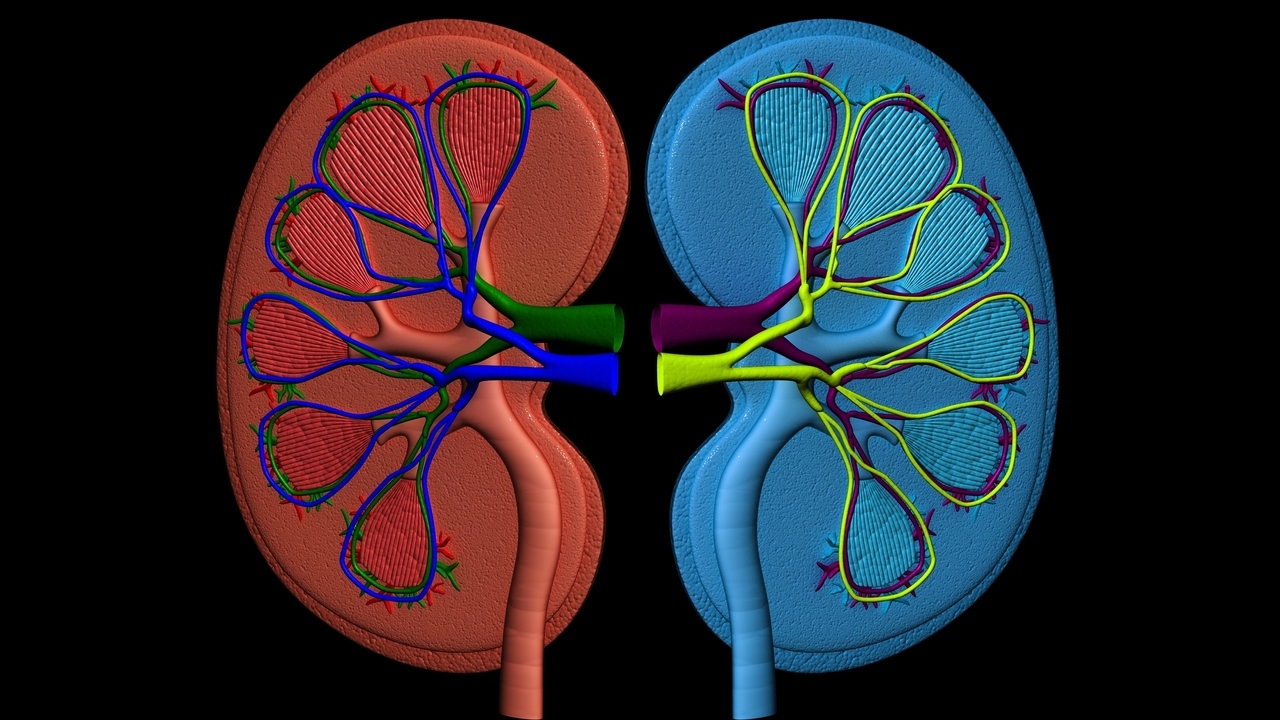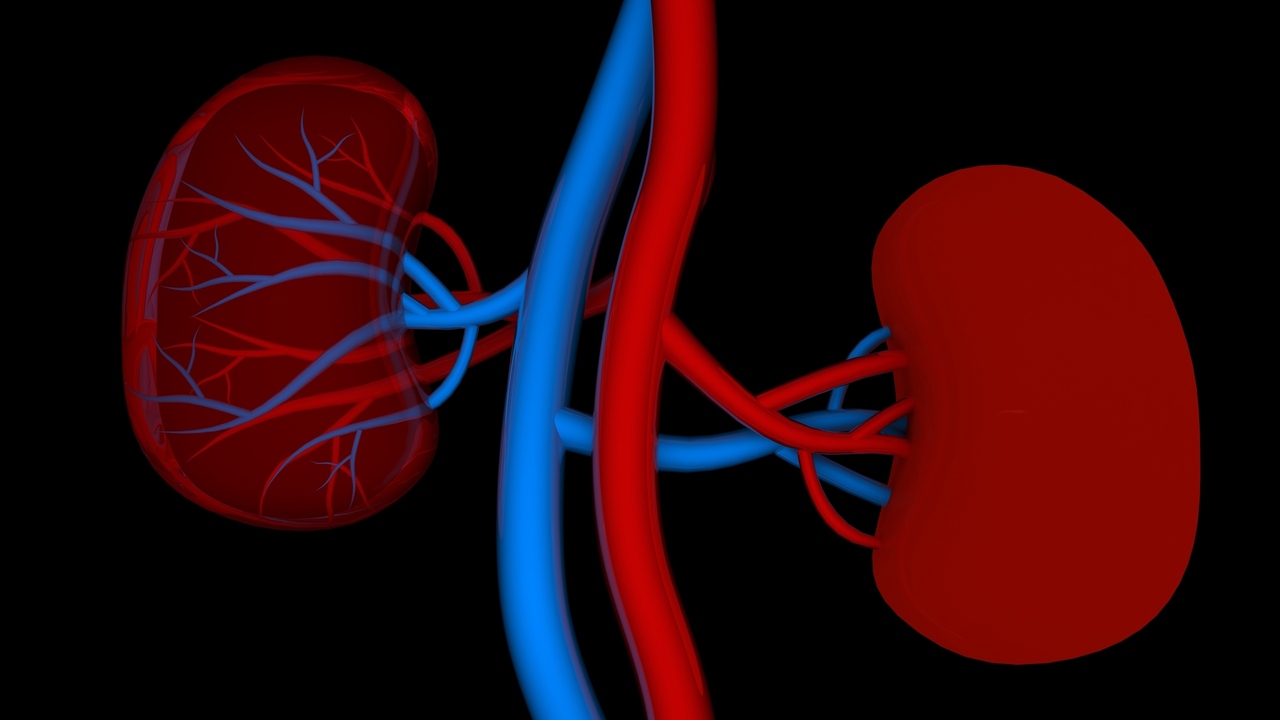Lessa Ennis, of Austin, donated a kidney to help her step-father. But her kidney did not go to him, it went to a stranger. And that stranger's wife donated her kidney to help Lessa's step-father. This way both patients with kidney failure got a kidney from a tissue type matched living donor.
Last year 16,520 kidney transplants were performed in the United States, with 36% from living donors. But 82,500 Americans are still on the waiting list for a kidney. The Alliance for Paired Donation seeks to increase the number of living donors by pairing families according to tissue type.
Kidney failure, requiring dialysis or transplant, is often the end result of long-term kidney disease. But it doesn't have to be this way. Medical researchers are actively exploring ways to prevent and treat kidney disease. One promising area of research is renal apoptosis. A recent article in the Journal of the American Society of Nephrology reviews the progress.
Apoptosis is an active form of cell death that I like to think of as deliberate. Researchers estimate that 10 billion cells per day die from apoptosis in a healthy human, and are replaced by new cells formed by mitosis. This process of cell replacement is believed to be essential to tissue repair. The balance of mitosis and apoptosis protects our health against cancer (too much mitosis) and organ failure (too much apoptosis).
The cancer drug cisplatin has been shown to promote apoptosis in the kidneys, as we might expect. Unfortunately, other drugs also promote renal apoptosis as a side effect. Acetominophen and the aminoglycoside antibiotics can cause kidney damage by inducing too much apoptosis.
A few small molecules that inhibit apoptosis have been identified. IDN-6556 has been shown to inhibit apoptosis in the liver, and pifithrin-alpha has been used to protect kidneys used in transplants.
Molecular regulation of apoptosis shows promise for new therapies for kidney disease. For the present time, our best defense against chronic kidney disease is careful health monitoring.
References:
Austin American-Statesman, November 2, 2009, page 1.
Sanz AB et al, “Mechanisms of renal apoptosis in health and disease”, Journal of the American Society of Nephrology 2008; 19:1634-42.
Drugs that cause kidney damage:
https://www.empowher.com/news/herarticle/2009/11/02/top-ten-drugs-cause-kidney-damage
Risk factors for chronic kidney disease:
https://www.empowher.com/news/herarticle/2009/09/02/top-ten-risk-factors-chronic-kidney-disease
Linda Fugate is a scientist and writer in Austin, Texas. She has a Ph.D. in Physics and an M.S. in Macromolecular Science and Engineering. Her background includes academic and industrial research in materials science. She currently writes song lyrics and health articles.






Add a Comment4 Comments
Thanks for your mention of the Alliance for Paired Donation. We appreciate your highlighting this important option for kidney patients who have a willing, but incompatible donor. Readers can find out more from our Web site, www.paireddonation.org.
November 18, 2009 - 7:58amLaurie Reece
Alliance for Paired Donation
This Comment
Hi Laurie - Thank you for writing and for sharing the link to the website for the Alliance for Paired Donation. The US map illustrating the large number of states that your organization is working with is quite impressive. I hope you will keep us posted on news and developments as the Alliance grows and adds more partners. Your service is making a true difference in the lives of many people.
November 18, 2009 - 6:34pmTake good care,
Pat Elliott
EmpowHer Guide
This Comment
Hi Pat,
Just wanted to let you know that the Alliance's first altruistic donor chain (started by Matt Jones in 2007) is featured in the Nov. 30 issue of People magazine! (Yes, it's the "Johnny Depp/sexiest man alive" issue ;-))
The story has een widely read and many individuals are contacting us saying they want to be a donor. But still, so many people do not know about this option for incompatible donors. Right now, we really could use some RECIPIENTS who have type A blood, and an incompatible donor who is an O or B. We are so gratified to see the number of people who are interested in being a kidney donor - very heartwarming!
Thanks again for your help in getting the word out.
November 27, 2009 - 6:28pmThis Comment
Hi Laurie - That's fantastic news! Thanks so much for sharing it with us, and congratulations! I looked for a link to the People magazine article to share with EmpowHer members but couldn't find one. I did find a local TV station story on one of the physicians featured in the article:
http://abclocal.go.com/wtvg/story?section=news/local&id=7130336
Hopefully the coverage in your local media, as well as the national exposure in People magazine, will help get the word out about your services and about the need for specific types of recipients.
Please keep in touch and keep us updated on the important work you and your team are doing.
November 30, 2009 - 5:14pmBest regards,
Pat
This Comment